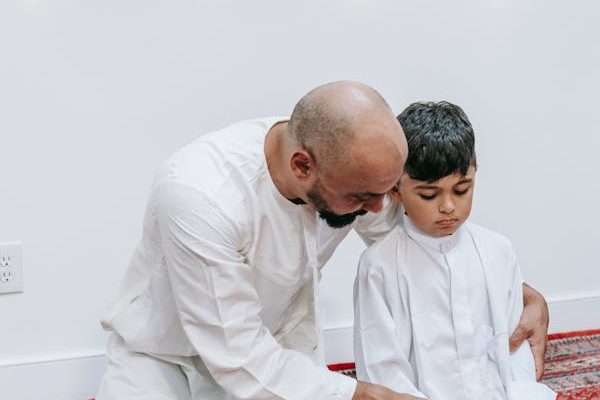AIMA Mindsavers is a pioneering 5-pillar framework, A practical framework for better mental health, designed specifically for Muslim communities in Australia.
This initiative is a community-led, spiritually guided response to the growing mental health challenges we face today.
Rooted in faith, compassion and evidence-based practices, AIMA Mindsavers is being rolled out nationally through mosques, offering a culturally and spiritually aligned approach to mental wellbeing.
Islam provides a sense of purpose and emotional fulfillment through attachment to God. Spirituality and religiosity are also associated with better mental health and have been identified as essential aspects of preventing and treating mental illness.
Islamic spirituality provides ultimate purpose and meaning to human life—two aspects central to human flourishing and maintaining a healthy emotional state. At Islam’s core is the concept of servitude, surrender, and submission to the Divine. And, in doing so, we are, counterintuitively presented with the opportunity to attain true freedom and liberation from the shackles of this world.
The freedom and relief that comes from this surrender through worship has been shown to have profound effects on the brain. Through daily prayer (salah), supplication (du’a), and God’s remembrance (dhikr), we are provided with constant sources of protection and avenues for therapeutic relief. Within the idea of submission is also the notion of Divine Destiny (qadar)—the belief that everything that happens to us is part of God’s just, wise, and compassionate plan. This shifts our thinking from agonizing over questions like “Why Me?” or “What did I do to deserve this?” to more self-empowering frameworks that offer hope, a deepened sense of God-consciousness, and solace in the Qur’an.
Through this framework, Islam provides the strongest anchor by which to navigate life: a deep attachment to God.
The Duha Approach is one example of how our religious tradition offers guidance on dealing with trauma and pain.
This approach is based on the chapter of the Quran known as ad-Duha (The Dawn). This chapter was revealed during a particularly difficult period in the life of Prophet Muhammad ﷺ that was marked by profound sadness and anxiety. By reflecting on the surah and deriving lessons from it, we hope it can serve as a blueprint for how one may overcome and healthily manage things like suffering and trauma. Each of the steps in the Duha Approach mirrors the structure of the chapter itself:
The first step in the Duha Approach is to establish a sense of attachment and connection to Allah. Experiencing hardships or trauma is not necessarily a sign of God hating you, as even the greatest of human beings—such as the Prophet ﷺ—experienced severe difficulties.
The second step is to shift perspective and remind ourselves that no matter what we may be experiencing now, it will pass, just as this world itself will one day pass. The Hereafter and its promises of reward and permanent contentment far outweigh the brief hardships of this world. The chapter then provides an example of what might be similar to a technique in cognitive therapy: seeking to reshape how we view and interpret our current state of affairs. This surah does so by diverting the Prophet’s ﷺ attention away from his present difficulties and instead reminding him of the blessings Allah has bestowed upon him, and of His guidance and care for him. The next step is to take action to better our patterns of behavior and thus our mindsets.
And lastly, this approach encourages the cultivation of gratitude. Consistently acknowledging things that are worth being grateful for which can radically improve our general state of being.
The Prophet ﷺ embodied what it means to be a mindful Muslim. He would frequently retreat to a quiet place of seclusion (Cave Hira) even before receiving the message of Islam. There, he found clarity and refuge. It was during one of these meditative moments that he received the miraculous revelation of the Qur’an.
In Islam, mindfulness and meditation are tied to the concept of muraqabah: a comprehensive form of self-awareness that is deeply intertwined with God-consciousness. It is the idea of living and being in the world as the Divine designed in order to attain true presence and reach higher states of spiritual strength and connectedness, especially in prayer.
Islamic teachings validate negative emotions and mindsets, and from these teachings we can derive practical tips to overcome them.
The Qur’an describes human nature as prone to anxiety and fear:
“Truly, man was created anxious; when evil befalls him, fretful; when good befalls him, begrudging, except for those who perform prayer.”
(Qur’an 70:19-22)
Some practical steps from the Islamic tradition to deal with negative emotions include:
Practice the sunnah of husn al-dhann (having a good opinion of others). Give others (and yourself!) excuses and try to understand where your thoughts or emotions might be coming from. Also understand that other peoples’ actions may not be a reflection of their feelings towards you, but a reflection of their own negative experiences.
Recall the Prophet ﷺ and the difficulties he endured compared to your own.
Remind yourself that there are great blessings and opportunities in difficulties and suffering, and that it is God’s promise that we will be tested by things that may cause us anxiety, grief, a sense of loss, and more: “We will certainly test you with a touch of fear and famine and loss of property, life, and crops. Give good news to those who patiently endure…”
(Qur’an 2:155)
Lastly, strive to remember that Allah is always with you, even if it feels like the entire world is against you.

Historically, many Muslim scholars dedicated their lives to exploring spiritual and psychological questions of human well-being and flourishing. This paper attempts to uncover some of this lost heritage to demonstrate its relevance to modern discussions in mental health.

Why is establishing a healthy identity important when it comes to raising confident and resilient Muslim children? What steps can parents take to help their child develop a strong Islamic core, confidence and identity as a Muslim?